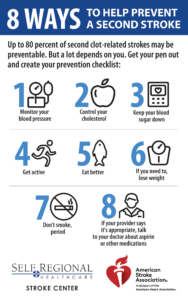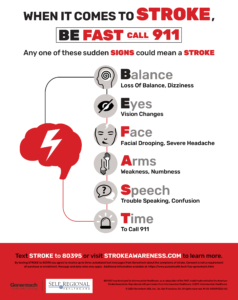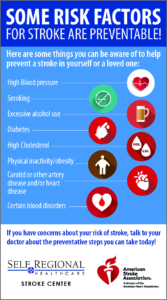Self Regional Healthcare’s Stroke Center
The Stroke Center at Self Regional Healthcare focuses on a broad range of care, from community education and screenings to the education of patients, families and healthcare staff.
Our mission: improve the quality of life for people in our community through stroke education and prevention, early diagnosis, advanced treatment, supportive care and rehabilitation.
Why Choose Us?
Self Regional’s Stroke Center is a DNV Primary Stroke Center serving a 7-county service area. By utilizing a multidisciplinary team approach, we provide rapid advanced diagnosis and treatment of acute stroke while utilizing evidence-based practices for stroke patients to reduce complications and improve their outcome.
We have designated stroke units and also strive to provide aggressive rehabilitation services to improve outcomes for stroke survivors, as well as a focus on providing thorough education, planning, and follow up for successful discharges and recovery.
A stroke can be a devastating event for patients and their families, and we understand that. Which is why a priority of the program includes providing evidence-based care that emphasizes rehabilitation and family support services.
Susan’s Story
Stroke Survivor Susan Timmerman recalls her experiences and tells us what she’s most grateful for these days.
The Basics of a Stroke
A stroke or “brain attack” occurs when a blood clot blocks an artery (a blood vessel that carries blood from the heart to the body) or a blood vessel breaks, interrupting blood flow to an area of the brain. When either of these things occurs, brain cells begin to die and brain damage occurs.
When brain cells die during a stroke, abilities controlled by that area of the brain are lost. These abilities
include speech, movement and memory. How a stroke patient is affected depends on where the stroke occurs
in the brain and how much the brain is damaged.
Learn more here.
Why choose a hospital with a designated Stroke Center?
Stroke Centers adhere to strict requirements, to include standards, clinical practice guidelines, and performance measurement for staffing of resources and specialists, response times, training, performance improvement and stroke prevention activities.
Stroke centers have dedicated and organized stroke teams that respond promptly. Hospitals that are not designated as stroke centers may have, and be staffed by, an emergency room physician but not have organized teams led by physicians trained in interventional neurological or surgical procedures to manage ischemic or hemorrhagic stroke.
Our Services
We specialize in treating many forms of stroke and conditions of the brain, including:
- Arteriovenous malformation (AVM)
- Cerebral aneurysm
- Hemorrhagic stroke
- Ischemic stroke
- Transient ischemic attack (TIA)
Time is Everything
Primary prevention is a crucial component of our program. 45 minutes door to TPA is our motto, and our interdisciplinary team utilizes advanced technologies to diagnose stroke and expedite treatment options.
My Stroke Warning Signs
Call 911 immediately if you have any of these symptoms:
• Sudden numbness or weakness of the face, arm or leg, especially on one side of the body
• Sudden confusion, trouble speaking or understanding
• Sudden trouble seeing in one or both eyes
• Sudden trouble walking, dizziness, loss of balance or coordination
• Sudden, severe headache with no known cause
Advanced Care Options
- 24/7 Neurology Coverage
- 24/7 CT and Imaging Services
- 24/7 Neurosurgical Coverage
- 24/7 Stroke Team Pager Group
- Transfer agreements with many regional comprehensive stroke centers





